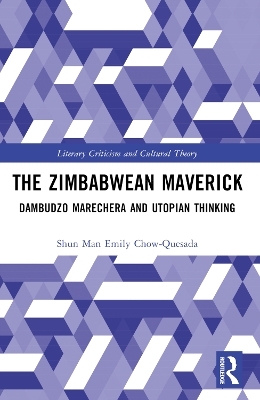
The Zimbabwean Maverick
Routledge (Verlag)
978-1-032-33248-2 (ISBN)
This book seeks to unfold the complexity within the works of Dambudzo Marechera and presents scholars and readers with a way of reading his works in light of utopian thinking. Writing during a traumatic transitional period in Zimbabwe’s history, Marechera witnessed the upheavals caused by different parties battling for power in the nation. Aware of the fact that all institutionalized narratives – whether they originated from the colonial governance of the UK, Ian Smith’s white minority regime, or Zimbabwe’s revolutionary parties – appeal to visions of a utopian society but reveal themselves to be fiction, Marechera imagined a unique utopia. For Marechera, utopia is not a static entity but a moment of perpetual change. He rethinks utopia by phrasing it as an ongoing event that ceaselessly contests institutionalized narratives of the postcolonial self and its relationship to society. Marechera writes towards a vision of an alternative future for the country. Yet, it is a vision that does not constitute a fully rounded sense of utopia. Being cautious about the world and the operation of power upon the people, rather than imposing his own utopian ideals, Marechera chooses instead to destabilize the narrative constitution of the self in relation to society in order to turn towards a truly radical utopian thinking that empowers the individual.
Shun Man Emily Chow-Quesada is an Assistant Professor in the Department of English Language and Literature at Hong Kong Baptist University. Her research focuses on world and postcolonial Anglophone literature, and the representations of Africa in Hong Kong. She has published journal articles and book chapters on Anglophone African literature and taught courses in world literature, postcolonial literature, African literature, and representations of blackness. She is also the editor of the "Hong Kong and Chinese Literature and Culture" section of Hong Kong Review of Books.
Contents
Acknowledgments
Introduction: Situating Marechera and Utopia
Chapter 1: Marechera, Heimat, and the Utopian Function of Literature
Literature and Utopian Thinking
The Role of the Writer
Marechera’s Heimat
Chapter 2: The Utopia of an Outsider
The Escape Mentality
The "Outsider" and the "Nowhere"
Ambiguity and Openness
Chapter 3: Violence and Power
Power in Violence
Women in Violence
Violence and Aporia
Chapter 4: Narratives of Identities
Racial Identity
Ethnic Identity
National Identity
A Being of Rootlessness
Chapter 5: The (Un)Real
Orientating Reality
Melting the "Columns" of Society
Embracing the "(Un)real"
Chapter 6: The Writer and the Community
The Individual versus the Collective
A Constellation of Individuals
Responsibility and Emancipation
Conclusion: Marechera – the "Dissident"
| Erscheinungsdatum | 17.08.2022 |
|---|---|
| Reihe/Serie | Literary Criticism and Cultural Theory |
| Verlagsort | London |
| Sprache | englisch |
| Maße | 152 x 229 mm |
| Gewicht | 453 g |
| Themenwelt | Geisteswissenschaften ► Sprach- / Literaturwissenschaft ► Anglistik / Amerikanistik |
| Geisteswissenschaften ► Sprach- / Literaturwissenschaft ► Literaturwissenschaft | |
| Naturwissenschaften ► Geowissenschaften ► Geografie / Kartografie | |
| Sozialwissenschaften ► Ethnologie | |
| Sozialwissenschaften ► Politik / Verwaltung ► Politische Systeme | |
| Sozialwissenschaften ► Politik / Verwaltung ► Politische Theorie | |
| Sozialwissenschaften ► Politik / Verwaltung ► Staat / Verwaltung | |
| Sozialwissenschaften ► Soziologie ► Spezielle Soziologien | |
| ISBN-10 | 1-032-33248-4 / 1032332484 |
| ISBN-13 | 978-1-032-33248-2 / 9781032332482 |
| Zustand | Neuware |
| Informationen gemäß Produktsicherheitsverordnung (GPSR) | |
| Haben Sie eine Frage zum Produkt? |
aus dem Bereich


